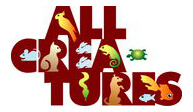Recommended Diet for Captive Iguanas
(Taken from Mader’s Reptile Medicine)
All plant material is washed, chopped (a food processor is recommended), and thoroughly mixed. This will ensure a balanced diet in that all food items will be eaten, rather than just the favorite or tasty ones. Prepare enough for 4 to 7 days, store in the refrigerator between feedings, and served at room temperature or slightly warmer.
Hatchlings up to 14 inches in length:
Feed twice a day or provide continuous availability
Plant matter finely chopped or shredded
Juveniles up to 2.5 years or 3 feet in length:
Feed once a day
Plant matter fine to medium chopped or shredded
Adults over 2.5 years and 3 feet in length:
Feed Daily or every other day
Plant matter coarsely chopped
Ingredients: EACH MEAL contains ingredients from ALL FIVE of the following categories:
- Calcium-rich vegetables: 30 – 40 % of the diet, two or more items per feeding – turnip greens, mustard greens, beet greens, kale, collards, bok choy, Swiss chard, dandelions, parsley, escarole, spinach, alfalfa pellets
- Other vegetables: 30 – 40 % of the diet, a variety weekly – frozen mixed vegetables, squash, zucchini, sweet potato, bell pepper, broccoli, peas, beans, okra, grated carrot, sprouts
- Grain/fiber: up to 20 % of the diet – whole grain breads, and natural bran cereals.
- Fruits: no more than 15 % of the diet – figs, papaya, melon, apple, peaches, plums, strawberries, tomatoes, banana (with skin), grapes, kiwi
- Vitamin/mineral supplementation: supplementation is advised, because vitamin and mineral deficiencies are common in iguanasl However calcium and the fat-soluble vitamins (A, D, E, and K) can be over supplemented as well as under supplemented. To avoid over supplementation, natural sources from a varied diet are the best choice, with moderate vitamin/mineral use to balance the diet. To date there are no documented studies on specific requirements for any lizard species.
Minerals: Use powdered calcium carbonate ( cuttlebone shavings is one source) or calcium gluconate.
Mix 1 part vitamin and 2 parts mineral.
Hatchlings and juveniles: 1 small pinch per feeding
Adults: 1 full pinch per 2 lbs. body weight twice a week
Adult females: 1 full pinch per feeding from December until egg laying.
Groups: 1/8 tsp. Vitamin/mineral mix per 3 lbs. iguana per week
A comment about protein sources: This is a highly controversial area. Traditionally, animal protein sources have been recommended in the diets of iguanas. However, in the wild they are folivores, a type of vegetarian that eats primarily leaves. Some iguana books falsely claim that iguanas eat insects until they mature, then switch to a vegetarian diet as adults. This is not the case. They are vegetarians from birth even through they might occasionally accept unnatural foods, such as crickets or even mice in captivity. Even though animal protein sources traditionally have been recommended for iguanas, their necessity has not been scientifically documented. Protein should be supplied as a plant based source.
Protein sources to avoid:
Little nutritional value: crickets, mealworms, king mealworms
Too much protein and/or calcium: small pre-killed mice, primate diets, trout chow, dog and cat food
A comment about canned, frozen, and other commercial iguana diets: The advantage of these products is that they are easier to use than preparing a balanced salad several times a week. The disadvantage is that in spite of claims that the commercial diets are complete and balanced, they may not be so. The exact nutritional requirements for green iguanas have never been scientifically determined. Young, rapidly growing iguanas have dietary requirements that differ from those of mature adults, as in the case in puppies and mature dogs. Commercial iguana diets do not address this difference. The ingredients are items to which an iguana in the jungle would never have access. Likewise, symptoms from eating an unbalanced diet may take years to develop. Commercial iguana diets are unproven. They may have a role in iguana nutrition but should only be part of the diet until more is known.

